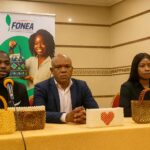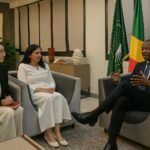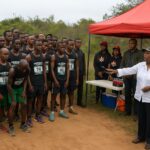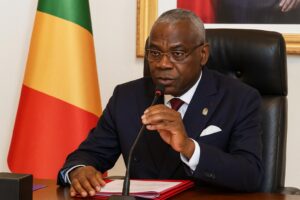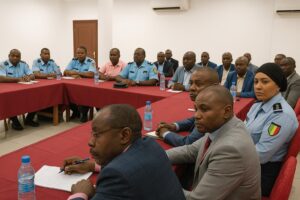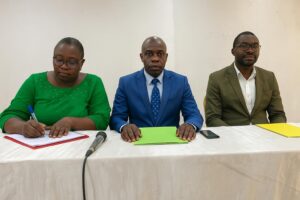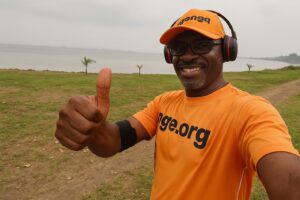Running through Odzala rainforest
On 11 October, 120 runners laced up for the second Odzala Forest Marathon, sprinting from Mboko lodge through red-earth tracks shaded by century-old trees. For many, the chance to race while hearing parrots and distant elephant calls was irresistible.
The organisers, eco-tourism company Kamba and park manager African Parks, split the field into 42-km, 21-km and 10-km routes, flagging each start an hour apart. This allowed elite athletes and weekend joggers alike to test themselves without overcrowding narrow forest paths.
Locals lined the course, clapping homemade wooden clappers, while curious guenons watched from canopy vines. Visitors arriving from Brazzaville hopped off charter flights straight into this raw spectacle, turning a remote clearing into the country’s liveliest sports arena for one morning.
Race results and rising stars
The 10-km contest finished in a Mbomo sweep, Joseph Obanga gliding home in 42 minutes, one stride ahead of Vérité Ilazi and Alvarince Olendé. Spectators gasped as the trio collapsed on cool grass, medals still warm in ministerial hands.
Half-marathon glory went to Fred Itadi of African Parks, clocking 1 h 37. Arnaud Mbongo and Swiss volunteer Guillaume Vorburger followed seconds later, their GPS watches beeping beneath flying sweat. The full 42-km proved tougher; ranger Djibil Agnouka triumphed in 3 h 49 after passing elephant dung steam.
Winners pocketed handcrafted trophies, return nights in the luxe Ngaga Lodge and modest cash, but most valued bragging rights. “The forest decides your pace,” Agnouka smiled, his calves streaked with red dust. “We only borrow the trail from gorillas.”
Government backing boosts ambition
The symbolic starter’s pistol belonged to Minister of Cultural, Tourism, Artistic and Leisure Industries Lydie Pongault, attending for the first time. Her presence signalled state recognition that sport can be a gateway to green destinations and new income for communities bordering Odzala-Kokoua.
After handing every finisher a medal, the minister promised to enshrine the race in the national calendar and help attract corporate sponsors. “This is a flagship product for Congo’s tourism portfolio, and we will accompany its growth,” she told reporters beside a banner fluttering with gorilla silhouettes.
Tour operators in Brazzaville welcomed the pledge. “Adventure travellers crave authenticity; a marathon among forest elephants ticks the box,” said Moboula Voyages director Armel Ndinga, noting bookings already rising for 2024 packages that bundle race bibs with river safaris on the Lekoli.
Conservation message at the heart
Marathon director Elza Gillman insists the event is first a conservation classroom. Runners pass signboards explaining carbon sinks, anti-poaching patrols and low-impact tourism rules. Mobile signal is patchy, but the message is clear: preserving 13,500 km² of rainforest safeguards wildlife and sustains local livelihoods.
The park, co-managed by the Congolese government and African Parks, shelters some of the planet’s largest populations of western lowland gorillas and forest elephants. Revenue from entry fees and accommodation funds ranger salaries and community schools, creating what officials call a virtuous tourism circle.
By aligning with that narrative, the marathon wins allies in environmental NGOs and opens funding doors. Last year’s debut attracted 50 participants; doubling the field in 2023 suggests the model resonates. Organisers aim for 300 runners within three years, subject to carrying-capacity studies.
Community and children in the spotlight
While elites pounded kilometres, village kids tackled their own “Odzala Olympic Games”. Nine playful stations—from ring toss to sack race—turned the sandy schoolyard into a carnival. Lydie Pongault joined the tug-of-war, her high-heels swapped for sneakers, drawing loud cheers and smartphone flashes.
Local artisans set up stalls of carved wooden gorillas, woven raffia hats and steaming cassava dough, ensuring tourist francs circulate inside Mbomo district. “The marathon weekend equals three market days for us,” smiled basket maker Mama Gisèle, clutching her day’s takings like a finisher’s medal.
That inclusive spirit, observers say, differentiates Odzala from purely elite road races in capital cities. Here, asphalt gives way to ancestral trails, and everyone—from rangers to schoolchildren—finds a role. Such cohesion aligns with national objectives of balanced regional development reiterated in recent cabinet briefings.
Next steps for an eco-sport showcase
Organisers are already mapping minor route adjustments to avoid freshly identified elephant corridors. Drone footage captured during the marathon will be stitched into a 60-second promo aimed at social media, where #RunOdzala posts surged 400 % on race day, according to agency SocialQ.
Infrastructure remains a challenge: the laterite airstrip handles only small aircraft and rains can flood sections of the course. Kamba confirms discussions with civil aviation officials and local councils to grade runways and install kilometre markers made from recycled plastic planks.
If successful, Odzala could inspire similar eco-races near other protected areas, from Conkouati’s beaches to the Lefini cliffs. For now, runners nurse sore legs, children hum victory songs, and the forest resumes its patient rhythm, ready to welcome next year’s footsteps.
Tourism observers highlight that international running tours represent a 9 % annual growth niche globally. “Positioning Congo early keeps us competitive,” argued economist Pauline Makosso, citing data from World Travel & Tourism Council that adventure travellers spend 60 % more per trip.
Ultimately, the Odzala Forest Marathon blends endurance, education and economic hope into one heartbeat. Each stride kicks up dust that settles as opportunity: for guides, for traders, for wildlife, and for a nation eager to showcase its green crown to the world.



